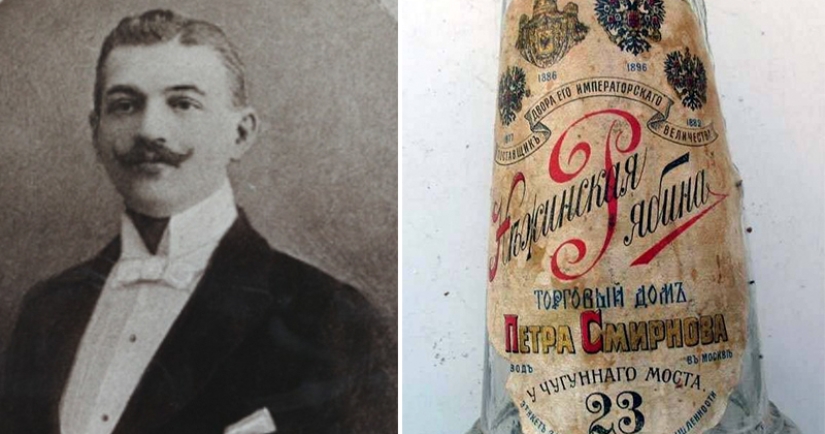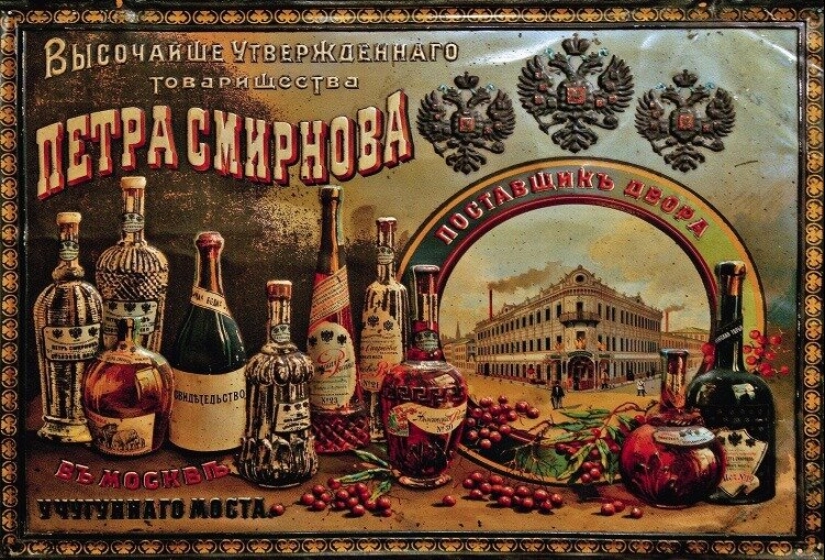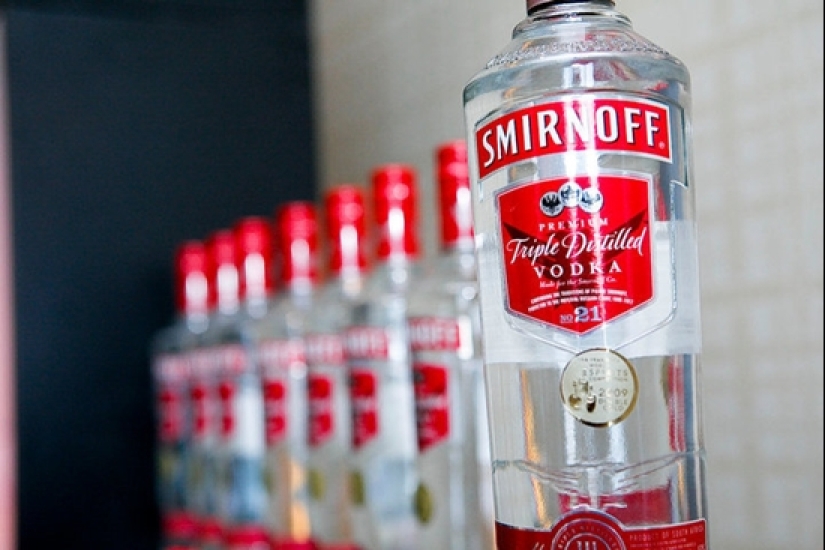From serf to court supplier: the story of the “vodka king” Pyotr Smirnov
Categories: Food and Drinks | History
By Pictolic https://pictolic.com/article/from-serf-to-court-supplier-the-story-of-the-vodka-king-pyotr-smirnov.htmlSmirnoff brand vodka is known all over the world. Many consider it Russian, drawing conclusions from the name. The famous British company Smirnoff really has Russian roots. The company was founded in 1863 in Moscow by entrepreneur Pyotr Arsenievich Smirnov and it operated successfully until the October Revolution. The life of Pyotr Smirnov, who was rightly called the “vodka king,” was eventful and interesting, so we decided to tell you about it.

Pyotr Smirnov was born in 1831 in the village of Kayurovo, Myshkinsky district, Yaroslavl province. His parents, Arseny Alekseevich and Matryona Grigorievna, were serfs, and are recorded in church books as Alekseevs.

Despite the fact that the Alekseevs were not free people, they did not live in poverty. In the 19th century, many landowners allowed their peasants to engage in commerce, receiving a share of the profits from it. The business of the Russian “candy king” Alexei Abrikosov was born in exactly the same way.
In the mid-1810s, Peter's father and his brother Ivan went to Moscow, where they began producing and trading alcohol. The business brought good income, and the men dreamed of ransoming themselves and their families. But the rent, which by law was due to the master, ate up the lion's share of the profit. Therefore, Arseny Alekseevich’s dream did not come true soon, only in 1857. By this time, winemaking had become a family affair for the future Smirnovs, and their products were known and loved not only in the capital.
In 1858, the father took his sons Peter and Yakov to Moscow. There they took advantage of the right of free people to change their surname and turned into the Smirnovs. Since childhood, the brothers helped adults in their work and were well versed in winemaking. From the age of 10, Pyotr Smirnov worked in the shop of his uncle Yakov, who became a merchant of the first guild. The boy did not waste time and, like a sponge, absorbed important knowledge and secrets of the profession.

In Moscow, Peter also started with trade. He worked as a clerk in the Rensk cellar (an establishment selling alcoholic beverages to-go) that belonged to his father. The young man showed himself to be a diligent and smart worker. Therefore, his father handed over his business to him. Soon the new owner of the enterprise opened another shop and became a merchant of the third guild.
In 1864, Pyotr Smirnov founded the vodka factory “At the Chugunny Most”, which employed 25 people. The merchant never pursued super-profits at any cost. His company motto was:
It is interesting that Smirnov himself was a convinced teetotaler and never tried his excellent products.
Every year Smirnov’s case grew. At the end of the 1860s, he bought another factory from the merchant Shikhobalov and opened a network of wine cellars. Consumers highly appreciated the quality of Smirnov's products. They were also attracted to special recipes created by the merchant’s father. He actively used berries, roots and herbs, which gave vodka a unique, pleasant taste.

In 1869, Pyotr Smirnov was so confident in his brand that he applied for the right to become a supplier to the imperial court, but was refused. By the early 1890s, the industrialist, in addition to wineries, owned 15 warehouses, 7 glass factories and 4 printing houses that printed labels. In total, 1,500 people worked for Smirnov. During the year, the company bottled 50 million bottles of alcoholic beverages.
Vodka and wine were poured into glass containers of various capacities and shapes, which was very popular with customers. Every day, 200 carts delivered products in Moscow alone. By 1897, the company's turnover amounted to a huge amount of 19 million rubles. According to statistics, the industrialist occupied up to 60 percent of the alcohol market of the Russian Empire.

Smirnov vodka entered the international market. In 1873, the brand took part in the International Industrial Exhibition in Vienna. There, the brand's products received high awards and acquired numerous fans. Three years later, Smirnov’s vodka and wines were presented at the World Industrial Exhibition in Philadelphia. From that moment on, deliveries to the USA began.
In 1877, the Russian Ministry of Finance allowed Smirnov to place the state emblem of the Russian Empire on the labels, next to medals for victories in exhibitions. This was the highest recognition of product quality, and Pyotr Arsenievich officially became the “vodka king.”

Petr Smirnov was actively involved in charity work. Every year he spent large sums on the construction of hospitals and churches, support of schools and colleges. As a philanthropist, the industrialist was awarded a medal on the St. Andrew's ribbon, the Order of St. Anne of the II and III degrees.
In 1882, after participating in the All-Russian Industrial and Art Exhibition, the second state emblem appeared on the labels. No one in Russia had received such an honor before Smirnov. In 1885 he applied again and finally became a supplier to the imperial court. His vodka was loved by Emperor Alexander III himself, who was not entirely indifferent to alcohol.

After this, Smirnov received two more coats of arms, the Order of Stanislav III degree, the title of commercial advisor and the right to supply Cahors to all Orthodox churches of the empire. In 1897, Smirnov received a gold medal at an exhibition in Stockholm. This was the last award in the life of the “vodka king”. On November 29, 1898, the industrialist died suddenly. He handed over his business to his sons Peter, Nikolai and Vladimir.
The Smirnov company existed before the October Revolution. After the arrival of the Bolsheviks, it was nationalized, and the Smirnov family fled abroad. Having more than 15 million rubles in their accounts, the sons of the “king” easily founded a new business in Istanbul, and then in Lvov, which belonged to Poland. It was the Lviv factory that began producing products under the Smirnoff brand, now known throughout the world.

The company belonged to the Smirnovs until 1938, after which it was bought by John Martin, owner of the Heublein company. From that moment on, the brand completely lost all connection with Russia. In 1992, the Smirnov trademark was revived by Boris Smirnov, the great-great-grandson of Pyotr Smirnov. But the foreign company Diageo, which owns the rights to the brand, after numerous trials, absorbed the company, making it its subsidiary.
Recent articles

It's high time to admit that this whole hipster idea has gone too far. The concept has become so popular that even restaurants have ...

There is a perception that people only use 10% of their brain potential. But the heroes of our review, apparently, found a way to ...

New Year's is a time to surprise and delight loved ones not only with gifts but also with a unique presentation of the holiday ...